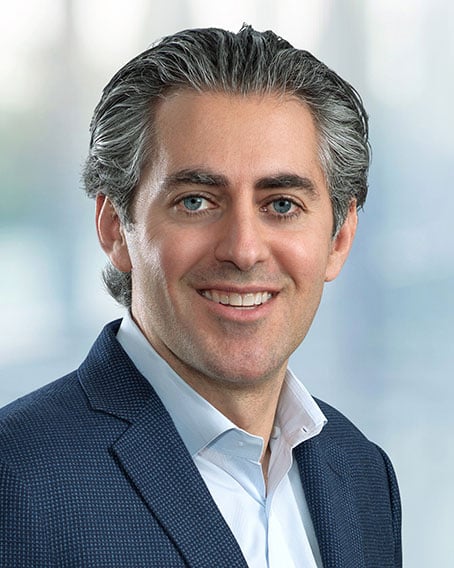Welcome to the R&G Tech Studio, a Ropes & Gray podcast series highlighting the firm’s technology attorneys, their respective practice areas and how the ever-changing tech landscape impacts their clients. On this inaugural episode, private equity partner Scott Abramowitz sits down to discuss his practice and how the fintech industry has evolved with TMT co-lead Ed Black.
Transcript:
Ed Black: I'm Ed Black, an attorney at Ropes & Gray, and I'm here to welcome everybody to the latest edition of our R&G Tech Studio podcast series. I'm here today with Scott Abramowitz, a leading transactional attorney from our Ropes & Gray private equity practice, who just does a ton in tech. Scott, it's great to be here with you. Before we get into your practice and the tech issues that are coming up in your practice, tell us about yourself: Who are you? Where do you live? What's your life like?
Scott Abramowitz: Sure, Ed—great to talk to you. I'm a partner based in New York in our private equity practice. I live here in New York City with my two little girls. And I spend my time representing private equity funds and their portfolio companies in all kinds of acquisitions, capitalization transactions, leverage buyouts, joint ventures, and other investment transactions—everything from what they do on the investment end through the exit. I represent both middle market and large cap sponsors in a range of industries, business services, technology, health care, and financial services. I'm sure we'll talk about the interplay between technology and health care and financial services—it’s been really interesting.
Ed Black: Now I know because we've worked together that tech plays a big part in your practice. And I don't mean the tech you use at the law firm—I mean the tech companies and the tech deals. But can you give us a sense of where your practice focuses in terms of tech companies and tech deals?
Scott Abramowitz: I do a lot of work in both the fintech and medical technology space. In all those transactions, there's a huge focus on personal information, data privacy, sharing of information that plays a really crucial role in those transactions. And the regulatory overlay in those transactions is extremely important, and in some cases very complicated and requires quite a bit of focus and sometimes some structuring and creativity on our part to make the deals work.
Ed Black: Is there an example? Is there something you worked on recently or that really comes to mind as something that exemplifies these issues?
Scott Abramowitz: In the fintech space right now, we're working with an asset manager that's trying to sell and share a portion of its client information to another asset manager. And the rules and regulation about how you can do that on both the data privacy front and how that interplays with SEC requirements and asset management requirements from that regulatory overlay is just really complicated. We've been creative in how we have structured the deal and framed the deal to allow the sharing of information and allow the transaction to move through.
Ed Black: Just out of curiosity, is this a deal where one manager went to another manager and said, "I have a pile of money, you have a pile of data—that seems like a deal to me"? And somebody's paying and somebody's getting the data. Is that pretty much it?
Scott Abramowitz: It's even more complicated than that. One of the managers wants to get out of the business, and you would think that wanting to get out of the business, selling your business to another asset manager would be fairly simple. But the data issues and the personal information issues have made it really complicated and led to a number of stops and starts, and our inability frankly to do the deal as simply as the client had initially wanted.
Ed Black: Now one place I know your practice has focused on—now that we're managing asset managers—is I know you've done fintech deals, especially fintech for technology companies that serve the asset management industry. And just to put that in context, is that something we think back 15 years ago, ten years ago, five years ago, five weeks ago, is that something we're seeing a lot of, seeing a little of? Are there trends there? How do you see that particular market evolving?
Scott Abramowitz: Yes. One of the trends that's been really interesting has been the opportunity for private equity to invest in technology businesses and what we think of as the middle office space. So, we think about fintech and asset management, there's regulated asset managers and the whole regulatory overlay that comes with being a registered investment adviser. But one of the places where we've seen a lot of investment and a lot of opportunity has been businesses that service asset managers, that aren't themselves regulated and aren't themselves asset managers. I represented a company called RIA in a Box, which basically provides technology to asset managers to allow them to evaluate their portfolios, reporting to clients, etc.—so a business that is at its core a technology business that its sole function is to power asset managers, but is not itself an asset manager. And that's been I think for private equity a very attractive space, because it allows them to participate in the asset management industry, the growth in that industry, but keeps them out of the regulatory overlay that creates a whole different set of complexities.
Ed Black: We're in this space that frankly you've described with a certain amount of richness here. This space where technology is jumping into—the example we've had is asset management—but jumping into service businesses generally, and data issues are taking over. Infrastructure companies are moving in and becoming an independent technology deal opportunity inside the context of a larger service industry. If you look at transactions that are sort of shaped like that, and it's an unfair question, but I'm going to ask you anyway: Where do you think we're headed? This is the crystal ball question. Where do you think we're headed three, four, five years out? Are we going to see more of these deals, less of them? Is it going to get easier or harder to do these deals? Anything's popping up on the horizon you see as landmines you need to have in mind? Where do you see the future for this type of deal?
Scott Abramowitz: I think that we'll see more and more of these deals, and I think they'll continue to be more complicated, in large part because I think the regulatory overlay and the scope of regulation is only going to grow. One of the places where I spend a lot of my time is in medical technology, and recently represented Cricket Health in its combination with InterWell. Cricket is a technology company who uses machine learning and data intelligence to improve health care in the kidney care space, and they partnered with InterWell Health, which is a physician-centered organization providing health care—and the intersection of health care, regulatory, data privacy creates a huge opportunity. It's a really exciting business, but the compliance regime to pull all that together is complicated and I think will only continue to become more and more complicated.
Ed Black: Now when these deals come along, particularly we talk about this Cricket deal as an example where a tech company with leading edge tech is integrating itself into a market-facing service organization, which is principally about humans providing services, and you've got the regulatory overlay. In health care, of course you've got all sorts of specific health care-related regulation. Is this something you just do yourself? Or how do you pull the team together to handle a deal at that level of complexity?
Scott Abramowitz: No, it takes an army. And one of the great things about my job as a private equity M&A lawyer is that I don't really have to know anything, but I work at a firm with really smart people who know a whole bunch of things. Our amazing health care team who touches on and really is thought leaders at the cutting edge of developments and changes in health care laws has been critically important. We have our data privacy team, which is a market leading team. We pull in resources from those groups and across the firm who really drive the expertise and knowledge, and the creativity in how we structure these deals.
Ed Black: All right, superb. We're running out of time—I've got one last question for you, and I stole it from ESPN. I saw an interview where LeBron James and Dwyane Wade were asked this question. One went one way, one went the other. I'm going to ask you, and then I'm going to tell you, are you more like LeBron James or are you more like Dwyane Wade, all right? So, in the peanut butter and jelly sandwich, which is more important, the peanut butter or the jelly?
Scott Abramowitz: It's an excellent question. I would say peanut butter though. I would say crunchy peanut butter, because the texture is extremely important.
Ed Black: You are LeBron James. Dwyane Wade says it's the jelly—he’s wrong.
Scott Abramowitz: I can tell you that's the first time that that analogy has ever been made.
Ed Black: Scott, I want to thank you for joining the discussion today. I also want to thank all our podcast listeners. For more information on the topics that we've discussed, including where to find Scott and his contact information, you can go to the Ropes & Gray website. This podcast will be posted up inside the technology, media and telecoms subset of the website, but ropesgray.com is what you need to remember, and there's a search function. This podcast is also available for subscription through all the places you normally find your podcast: Apple and Spotify. Scott, thank you so much for joining me. Thank you so much for listening.
Speakers

Stay Up To Date with Ropes & Gray
Ropes & Gray attorneys provide timely analysis on legal developments, court decisions and changes in legislation and regulations.
Stay in the loop with all things Ropes & Gray, and find out more about our people, culture, initiatives and everything that’s happening.
We regularly notify our clients and contacts of significant legal developments, news, webinars and teleconferences that affect their industries.



